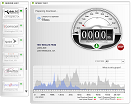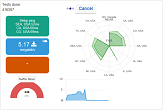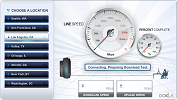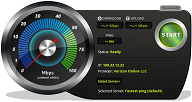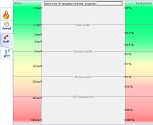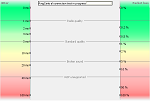J.D. Fox Micro Resource Center
Links
Internet Speed Tests
General Speed Tests
Introduction
Here are four sites that allow you to measure the speed of your Internet connection for free. They will all generally provide the same results. But, if you get something unexpected, try one of the others.
Keep in mind that these tests measure the access speed from the testing site all the way to your computer. If your speed is slower than you expect, it may be due to misconfiguration, congestion, or latency on your own network that slows down data transmissions between your Internet connection and your computer. For further assistance, contact an IT service professional.
System Requirements
All the links on this page require Adobe Flash to run on a desktop or laptop computer. You can read about and download Flash in the Website Media and Interactivity section.
Connection Type Considerations
If you are on a very high-speed connection (over 10 Mbps), use the Broadband Reports link below and select the Java-based test (you can read about and then download Java if you don't have it already).
If you are testing from a phone or tablet connected to a cellular carrier, you should use the Broadband Reports link, and select the appropriate option.
If your network uses a proxy/caching server, these tests may show random results, usually showing download speeds that are way too high, although they seem to have been improved recently to show accurate results.
None of the below speed tests may work accurately if you use a dial-up modem for Internet access.
The Links
1. Broadband / DSL Reports has several options for technologies to use for performing speeds tests, for a broad range of support for slow to fast connections, using various devices.
The Adobe Flash version will work just fine in most cases, and is easiest to use.
Use the new HTML 5 speed test for very high-speed links. This is a little more difficult to use.
The Java-based test is also accurate for high speeds, and you may wish to try this to compare with the others, or if the two above don't work for some reason. This requires you to install Java, of course.
2. Speakeasy is provided by a major Internet Services Provider, Megapath.
3. Bandwidth Place is an independent consumer information site.
4. CNET Reviews is another independent consumer information site. It's a bit brain-dead, because it doesn't show you the upstream vs. downstream split like the others.
Quality Tests
These links are for testing connection quality. This means in addition to download and upload speeds (data transfer rate), you can test for packet loss, latency, and jitter, three important factors to measure if you use VoIP (Voice Over IP) telephones and suffer from audio quality problems.
These tests require Java (you can read about and then download Java here if you don't have it already).
Keep in mind that the results of the tests do not by themselves give you a simple answer as to where a voice quality problem lies, especially since they only measure the connection between your computer and the test providers' servers. They are still useful, however, because you can compare the results of these tests to the results of any test your VoIP provider offers for measuring the quality of your connection to your VoIP provider's network. Two of the tests below are from well-known VoIP provders.
If you're having problems with VoIP quality, please contact a qualified professional for assistance, such as J.D. Fox Micro.
